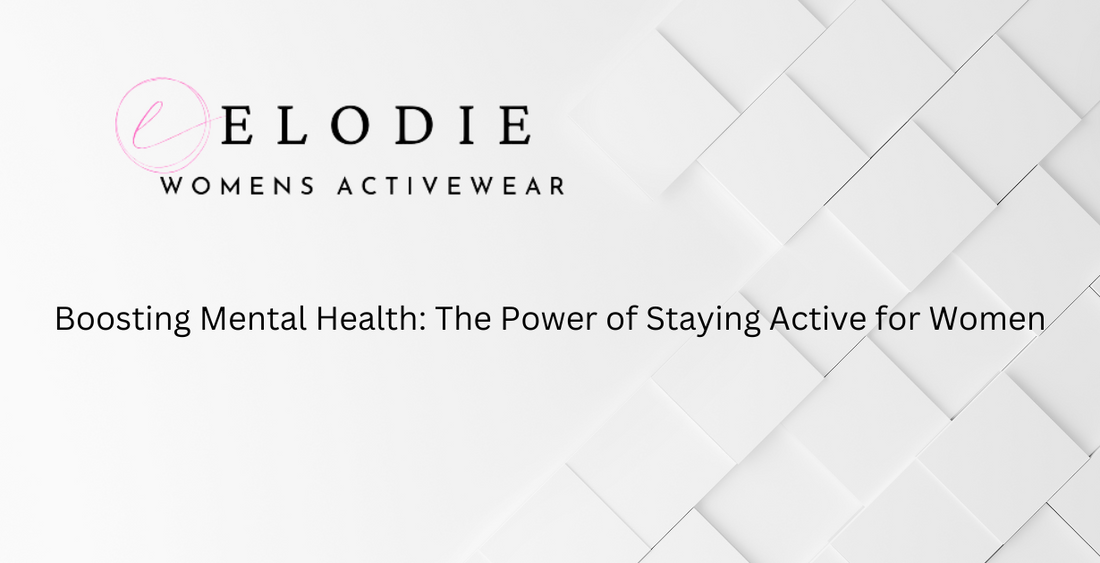
Boosting Mental Health: The Power of Staying Active for Women
Share
In today’s fast-paced world, maintaining mental health is as crucial as physical well-being. For many women, integrating regular physical activity into their routine can be a transformative approach to improving mental health. From enhancing mood to reducing stress, staying active offers numerous benefits for mental wellness. Here’s how exercise can positively impact your mental health and practical tips to incorporate it into your life.
1. The Connection Between Exercise and Mental Health
Exercise is more than just a physical activity; it's a powerful tool for mental well-being. Research consistently shows that regular physical activity can help alleviate symptoms of depression, anxiety, and stress.
Benefits Include:
- Endorphin Release: Physical activity triggers the release of endorphins, often referred to as “feel-good” hormones, which can enhance mood and create a sense of well-being.
- Reduction in Stress: Exercise helps lower levels of cortisol, the body’s primary stress hormone, leading to reduced feelings of stress.
- Improved Sleep: Regular activity can promote better sleep patterns, which is crucial for overall mental health.
2. Combatting Anxiety and Depression
Exercise is an effective tool in managing and reducing symptoms of anxiety and depression. Engaging in physical activity can provide a natural boost to your mood and offer a sense of accomplishment.
How Exercise Helps:
- Distraction from Negative Thoughts: Focusing on physical activity can provide a mental break from stressors and negative thinking.
- Increased Resilience: Regular exercise can enhance your ability to cope with stress and adversity.
- Social Interaction: Group activities, like fitness classes or sports, offer social support and reduce feelings of isolation.
3. Enhancing Cognitive Function
Staying active isn’t just about mood; it also positively impacts cognitive functions. Exercise can boost brain health, improve memory, and increase mental clarity.
Cognitive Benefits:
- Increased Blood Flow: Exercise enhances blood flow to the brain, supporting cognitive functions.
- Neuroplasticity: Regular activity encourages the growth of new brain cells and connections, aiding in memory and learning.
- Mental Sharpness: Physical activity can help keep the mind alert and focused, improving overall cognitive performance.
4. Building Confidence and Self-Esteem
Engaging in regular exercise can also improve self-esteem and body image, which are closely linked to mental health. Achieving fitness goals and experiencing physical improvements can boost confidence and self-worth.
Confidence Boosters:
- Achievement: Setting and reaching fitness goals can provide a sense of accomplishment and pride.
- Body Positivity: Regular activity helps build a positive relationship with your body, enhancing body image and self-esteem.
5. Finding the Right Activity
The key to reaping the mental health benefits of exercise is finding an activity that you enjoy and can sustain. Whether it’s a high-intensity workout or a calming yoga session, the best exercise is one that fits your lifestyle and preferences.
Suggestions for Finding What Works for You:
- Explore Different Activities: Try various forms of exercise to see what you enjoy most—running, swimming, dancing, or hiking.
- Set Realistic Goals: Start with manageable goals and gradually increase intensity to avoid burnout.
- Incorporate Variety: Mix different types of workouts to keep things interesting and engaging.
6. Making Exercise a Habit
Consistency is key to experiencing the mental health benefits of exercise. Incorporate physical activity into your routine by making it a regular part of your day.
Tips for Staying Active:
- Schedule Workouts: Treat exercise like an important appointment to ensure it becomes a regular part of your routine.
- Find a Workout Buddy: Exercising with a friend can increase motivation and accountability.
- Enjoy the Process: Focus on how good exercise makes you feel rather than just the physical results.
7. Overcoming Barriers
It’s natural to face challenges when starting a new exercise routine. Overcoming these barriers can help you stay committed to maintaining an active lifestyle.
Common Barriers and Solutions:
- Lack of Time: Prioritize short, effective workouts if your schedule is tight.
- Low Motivation: Set small, achievable goals and reward yourself for reaching them.
- Injury or Pain: Consult with a healthcare provider to adapt your routine and address any physical issues.
Conclusion
Integrating regular physical activity into your life offers profound benefits for mental health. From reducing stress and anxiety to enhancing cognitive function and boosting self-esteem, exercise is a powerful ally in promoting overall well-being. Embrace the positive changes that come with staying active and make exercise a fulfilling part of your journey to better mental health.
Start small, stay consistent, and celebrate the mental and physical improvements that come with an active lifestyle. Your mind and body will thank you!
